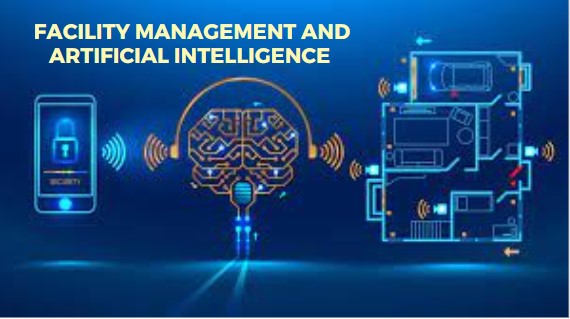
Role of AI in Facility Management
Madhurima Sanyal |
19 Feb 2024 |
17:02 PM
- Why AI Matters in Facility Management
- How AI is Influencing Facilities Management
- The Crucial Role of Artificial Intelligence in Facility Management
- 7 Ways AI is Shaping the Future of Facility Management
- Addressing Challenges in AI Adoption and Implementation
- Conclusion

Ultimate Building Inspection Checklist for Facility Managers
Madhurima Sanyal 05 Jan 2024 | 03:34 AMDiscover the evolution of facility management with the ultimate building inspection checklist for facility managers. Explore the future of facility inspection, embracing AI, IoT, and predictive maintenance for efficient, proactive management. Uncover ...
Understanding the Role of AI in Facility Management
Facility management encompasses a spectrum of tasks, from maintaining physical assets to optimizing operational efficiency. With the integration of artificial intelligence (AI), facility managers gain unprecedented insights and capabilities. AI analyzes vast amounts of data to streamline processes, predict equipment failures, and optimize resource allocation. By harnessing AI-powered software, facility managers can enhance energy consumption management, maximize space utilization, and unlock significant cost savings.
Why AI Matters in Facility Management
AI's significance in facility management lies in its ability to revolutionize traditional approaches and drive efficiencies across various facets. In an era where data reigns supreme, AI enables facility managers to leverage vast amounts of information to make data-driven decisions. This technology transcends the limitations of manual processes, offering real-time insights into energy consumption, space utilization, and asset performance.
By harnessing AI, facility managers can unlock significant cost savings, enhance operational efficiency, and optimize resource allocation. Moreover, AI-powered software empowers facility managers to proactively address challenges, predict maintenance requirements, and ensure the seamless functioning of facilities. Ultimately, AI emerges as a crucial catalyst in elevating facility management practices to new heights.
How AI is Influencing Facilities Management

Through advanced algorithms and machine learning capabilities, AI analyzes historical data to identify patterns, predict equipment failures, and optimize energy consumption. Facility managers leverage AI-powered software to streamline maintenance tasks, maximize space utilization, and enhance security protocols. Moreover, AI enables the integration of smart building technologies, fostering a dynamic and responsive environment.
The Crucial Role of Artificial Intelligence in Facility Management
Facility managers rely on AI-powered software to analyze vast amounts of data, enabling them to make informed decisions and enhance efficiency. AI-driven predictive analytics empower facility managers to forecast equipment failures, optimize energy usage, and maximize resource allocation. Moreover, AI facilitates the integration of smart building technologies, promoting sustainability and enhancing occupant comfort.
Optimizing Operations with AI
Energy Management and Optimization
AI revolutionizes energy management by analyzing real-time data, identifying patterns, and optimizing energy consumption. AI-powered software monitors energy usage, detects anomalies, and suggests strategies for optimization. By leveraging AI in facility management, organizations can implement energy-efficient solutions, such as smart lighting and HVAC systems. Additionally, AI facilitates predictive analytics, enabling facility managers to forecast energy demands and proactively address potential issues.
Predictive Maintenance for Efficiency and Reliability
AI-powered predictive analytics analyze historical data, equipment performance, and environmental factors to forecast potential failures before they occur. By detecting anomalies and patterns, AI enables facility managers to schedule maintenance tasks more efficiently, minimize downtime, and extend equipment lifespan. With predictive maintenance powered by AI, facilities can achieve higher reliability, reduce maintenance costs, and ensure seamless operations.
Maximizing Space Utilization and Optimization

AI plays a pivotal role in analyzing space usage patterns, identifying inefficiencies, and optimizing layouts. AI-powered software utilizes data analytics and space planning algorithms to design layouts that cater to the needs of occupants while minimizing wasted space.
Additionally, AI enables real-time monitoring of space utilization, allowing facility managers to adapt and reconfigure spaces as needed. Also, AI facilitates access control and security measures to ensure the safety and privacy of occupants. By maximizing space utilization and optimization with AI, facilities can enhance productivity, improve workflow efficiency, and create a more conducive environment for occupants.
Enhancing Security and Safety

AI is revolutionizing security protocols by enabling advanced surveillance and threat detection capabilities. By leveraging AI-powered software, facility managers can analyze real-time data from various sources to detect unusual activities and potential security threats. Moreover, AI technologies facilitate access control measures, allowing authorized personnel to access specific areas while ensuring data privacy and compliance with regulations.
Implementing Enhanced Security Protocols
Implementing enhanced security protocols is essential for safeguarding facilities against potential threats and vulnerabilities. AI plays a crucial role in strengthening security measures by analyzing data, detecting anomalies, and identifying potential risks in real time. AI-powered software enables facility managers to implement access control measures, monitor surveillance feeds, and respond promptly to security incidents.
Moreover, AI technologies facilitate predictive analytics, allowing facility managers to anticipate security threats and take proactive measures to mitigate risks. By leveraging AI in facility management, facilities can achieve higher levels of security, ensuring the safety of occupants and assets while maintaining data privacy and compliance with regulations.
Leveraging Integrated Communication Systems
Effective communication is vital for seamless operations and collaboration within facilities management. Artificial intelligence (AI) enables the integration of communication systems, facilitating seamless communication and collaboration among stakeholders. By leveraging AI-powered software, facility managers can streamline communication channels, automate workflows, and enhance decision-making processes.

Additionally, AI technologies enable real-time data analysis, providing insights into operational performance and resource allocation. Integrated communication systems powered by AI enhance efficiency, productivity, and responsiveness within facility management, fostering a collaborative environment conducive to achieving organizational goals.
Indoor Navigation Solutions for Large Facilities
Artificial intelligence (AI) offers indoor navigation solutions to improve wayfinding and enhance the overall experience within large facilities. AI-powered software utilizes real-time data, sensor technologies, and machine learning algorithms to provide accurate indoor navigation guidance. By leveraging AI in facility management, facility managers can create interactive maps, provide personalized navigation routes, and offer location-based services to occupants. Moreover, AI enables indoor positioning systems, allowing for precise location tracking and asset management within facilities. With indoor navigation solutions powered by AI, large facilities can optimize navigation, improve efficiency, and enhance the overall occupant experience.
Future Trends and Considerations
As the field of facility management continues to evolve, artificial intelligence (AI) emerges as a key driver shaping future trends and considerations. AI-powered technologies are revolutionizing traditional practices, offering innovative solutions to address complex challenges and optimize operational processes.
From predictive maintenance to space planning and access control, AI is poised to transform every aspect of facility management. Moreover, the rise of smart buildings and AI-powered software is enabling facility managers to make data-driven decisions in real time, enhancing efficiency and preventing emergency repairs. As we look towards the future, it's essential for facility managers to embrace AI technologies, adapt to changing trends, and address challenges in AI adoption and implementation to unlock the full potential of AI in facility management.
7 Ways AI is Shaping the Future of Facility Management
Predictive Maintenance: AI enables predictive analytics, allowing facility managers to forecast equipment failures and schedule maintenance proactively.

Space Planning: AI facilitates space optimization and planning, maximizing efficiency and productivity within facilities.
Access Control: AI-powered access control systems enhance security measures, ensuring the safety and privacy of occupants and assets.
Real-time Data Analysis: AI enables facility managers to analyze real-time data, providing insights into operational performance and resource allocation.
Enhanced Security: AI enhances security protocols, enabling facility managers to detect unusual activities and mitigate potential risks.
Automation: AI-driven automation streamlines routine tasks, reducing manual intervention and improving operational efficiency.
Sustainability: AI promotes sustainability initiatives by optimizing energy consumption, reducing carbon footprint, and enhancing environmental monitoring.
Addressing Challenges in AI Adoption and Implementation
While the potential of AI in facility management is vast, there are challenges associated with its adoption and implementation. These challenges include data privacy concerns, integration complexities, and the need for skilled personnel to manage AI technologies effectively.
Moreover, there may be resistance to change from stakeholders, requiring effective communication and change management strategies. To address these challenges, facility managers must prioritize data privacy, invest in training and education, and collaborate with AI technology providers to ensure seamless integration and implementation.
Conclusion
The Evolving Landscape of AI in Facility Management
The integration of artificial intelligence (AI) in facility management marks a pivotal shift in the industry's landscape. AI-powered technologies are revolutionizing traditional practices, empowering facility managers to optimize operations, enhance security, and maximize efficiency. From predictive maintenance to space planning and access control, AI is driving innovation and reshaping the way facilities are managed.
As we navigate the evolving landscape of AI in facility management, it's crucial for facility managers to embrace AI technologies, adapt to changing trends, and leverage AI to unlock new possibilities. By empowering facility managers with AI technology, we can create smarter, more efficient facilities that meet the needs of occupants and stakeholders alike.